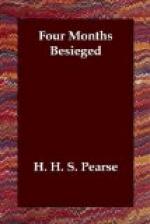November 15.—Half an hour after midnight all Ladysmith woke from peaceful slumber on troubled sleep at the sound of guns, from which shells came screaming about the town and into camps that had not been reached by them before. What it all meant nobody could say, but the firing did not cease until every Boer cannon round about our position had let off a shot. Some of us began to dress, thinking that the misty diffused moonlight was the coming of dawn. Women, huddling in shawls and wraps, rushed off with children in their arms to “tunnels” by the riverside, and there would have been something very like a panic among civilians if soldiers had not reassured them. The staff officer, who had been upon the watch for possibilities, until he heard the first Boer gun fire, and then got into pyjamas for a good night’s rest, saying, “There will be no attack now,” was a philosopher. Everybody cannot look at things in that cool way when shells are flying about, but a good many of us went back to bed again on discovering what the time was, puzzled to account for the evening’s extraordinary freak, but confident that it would not be repeated until daybreak. That brought drizzling rain and mists that have veiled the hills all day, putting a complete stop to all hostilities. We know nothing yet that can account for the firing of so many guns, and only attempt to explain it on the supposition that our enemies, being apprehensive of a renewal of yesterday’s attack, were startled by some false alarm. Not knowing from which direction the expected blow might be struck, they fired guns all round to keep everybody on the alert.
November 16.—We are becoming accustomed to the daily visitation of shells that do not burst, and perhaps familiarity is beginning to breed carelessness. If so, the 40-pounder on Lombard’s Kop gave us timely reminder this morning that he is not to be ignored with impunity. One shell thrown over the railway station burst in air, as it was intended to do, and scattered its hail of shrapnel bullets about that building. One guard, a white man, was killed on the spot or only breathed a few minutes after being hit, and two Kaffir labourers were wounded. Scores of bullets went into the station-master’s office, and the desk at which he generally sits was perforated like a cullender. In these times of siege that official would not be always on duty, and he was just then taking a lucky hour off. A Boer movement, probably of some convoy with loot from down country, was going on along the road froth Bulwaan towards Elandslaagte. Boer field guns covered it, keeping our scouts in check on the plain, and riflemen created a diversion with pretence of an attack on Observation Hill, which spluttered out slowly. Major Howard, 5th Dragoon Guards, has been recommended for the Victoria Cross in recognition of his gallantry on “Mournful Monday,” when, seeing a trooper fall, he walked back where bullets were falling thick, and brought the wounded man back on his shoulders in full view of several regiments. The Boers, inappreciative of pluck in that form, kept up a steady fire on the wounded trooper and his heroic officer until they were safe out of range.




